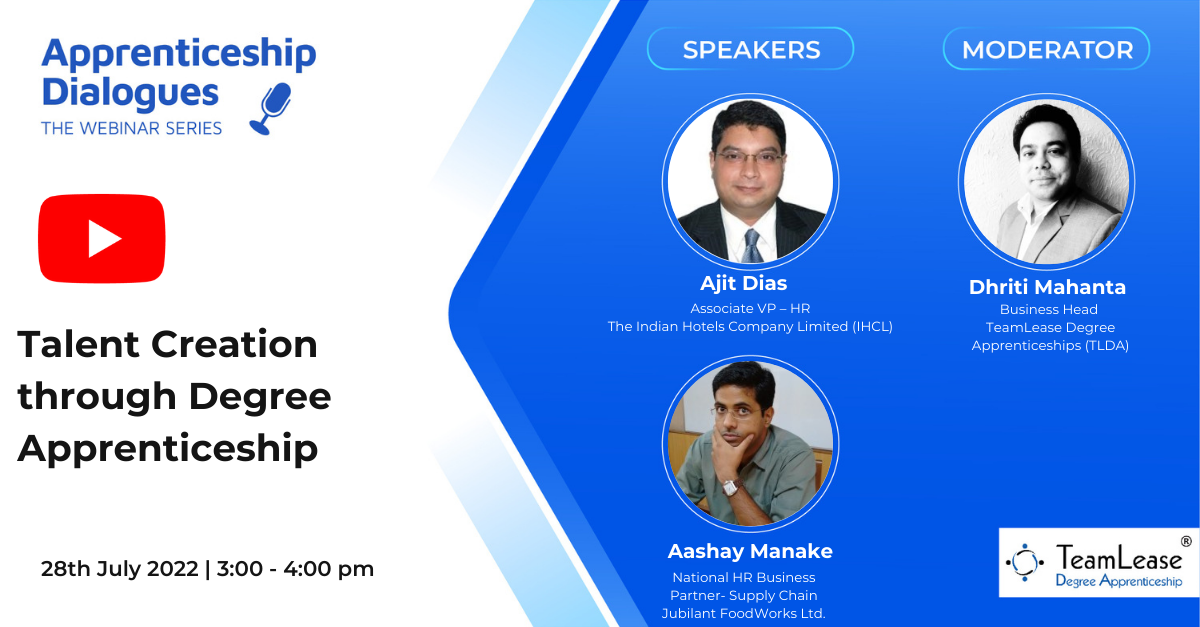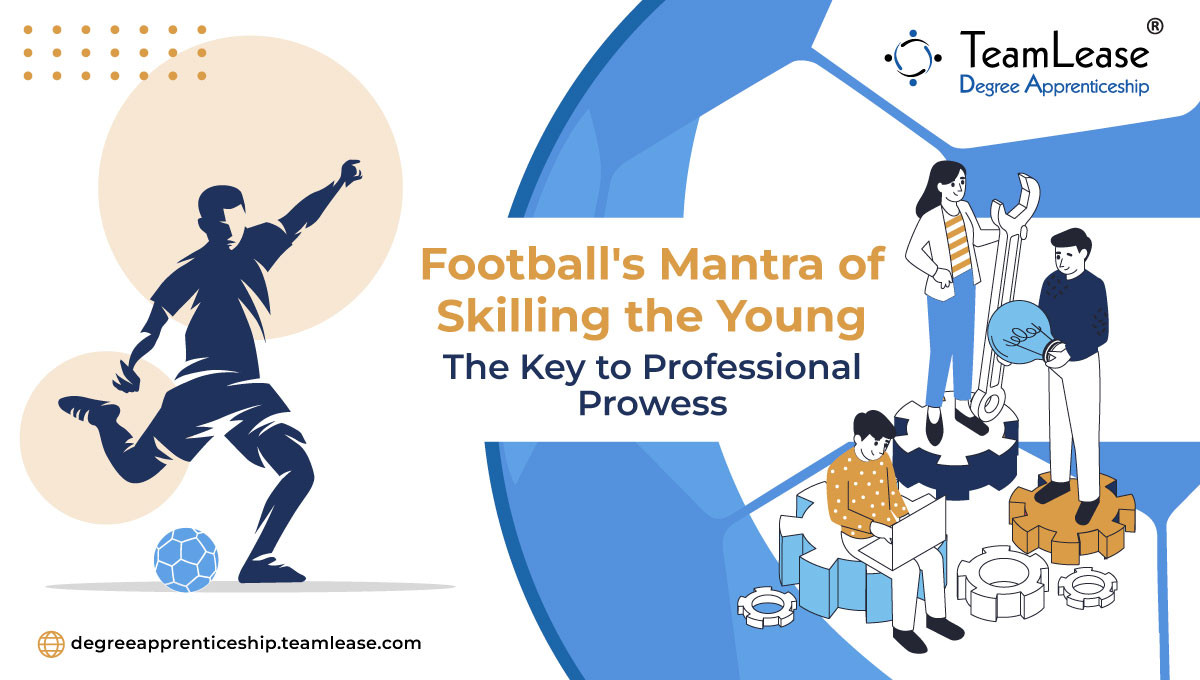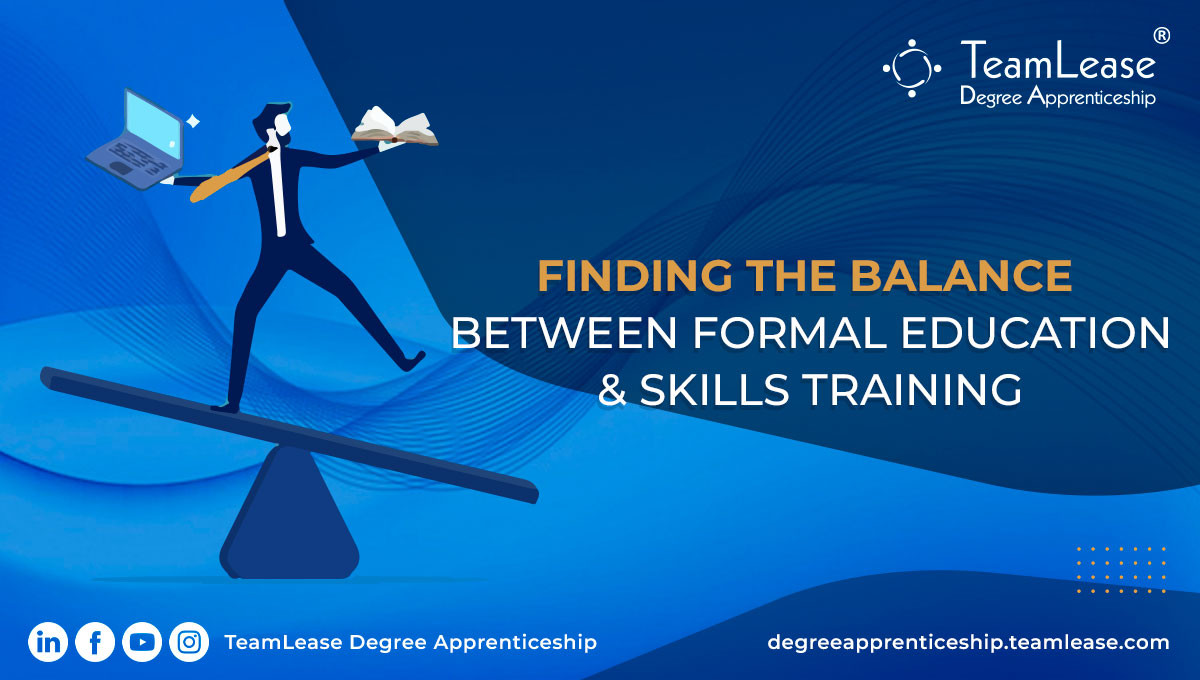TeamLease Degree Apprenticeship (TLDA) organised an online panel discussion on "Talent Creation through Degree Apprenticeship'', on the 28th of July, 2022. For the discussion, we invited two experienced leaders to bring out fantastic insights into the world of skill development, apprenticeships and talent creation.
Mr Ajit Dias, Associate Vice President – Human Resources at The Indian Hotels Company Limited (IHCL), Mr Aashay Manake, National HR Business Partner - Supply Chain, Jubilant FoodWorks Ltd and Moderator, Mr Dhriti Mahanta, Business Head, TeamLease Degree Apprenticeship (TLDA) had an interesting discussion on various aspects of apprenticeships in their respective industries.
Here is the summary of the entire session. Please read on.
India’s economy is thriving but there is still a deficiency of skilled resources and skill development programs. Moreover, supply chain centre operations constantly require skilled manpower as an integral part of their working ecosystem. Hence, apprenticeship is a natural choice to bridge this gap between skill and knowledge and create your own talent pipeline for the future. Apprenticeship programs give the liberty to groom talent as per the customised needs and help create a talent pool for the long run in the organisation. These increased demands for manpower and the advantages of having apprentices prompted our guest speakers to sort of look at an apprenticeship in a much larger way than it existed.
Both hospitality and food industries require tacit knowledge transfer. After the completion of one and a half year of apprenticeship training, it completely transforms the personality of the talent enrolled. Soft skills are the reasons for a change in personality and a great employability factor in the mentioned industries
 Productivity aspect of apprenticeship
Productivity aspect of apprenticeship
Productivity cannot be achieved in a single day, we all are aware of that. With apprenticeship training, the first three months are actually for talent to get accustomed to the environment. Like a campus to corporate kind of a transition. From the fourth month onwards, they start performing, delivering slowly and steadily, and you'd start seeing the actual results by the end of the 8th or 9th month or sometimes after the 12th month. After the completion of one year, Both hospitality and food industries require tacit knowledge transfer. Soft skills are a great employability factor in the mentioned industries.
So we have to wait for the productivity report card after a year of training.
 Degree apprenticeships: Blending on-the-job training with formal education
Degree apprenticeships: Blending on-the-job training with formal education
The word apprentice is not as glorified as other titles like management trainee or corporate trainee. Traditionally in both food and hospitality industries, apprenticeship has been the traditional route for leaders. So, yes it is an interesting idea to bring formal education into the apprenticeship program because it will create a balance between theoretical inputs and practical training.
Aashay Manake, National HR Business Partner - Supply Chain also believes this is a great idea and it will help improve employability prospects for a large number of students coming from underprivileged backgrounds. But we have to make sure that the rigour of domain knowledge or technical knowledge does not get diluted, by blending on-the-job experience along with parallel learning.
After completing the degree apprenticeship, organisations have to actively participate in providing a succession plan for apprentices. It's important to have at least a five-year framework for the progression of succession planning and provide HR frameworks to help see better longevity of apprentices in the organisation.
 Hiring trends specific to apprenticeship
Hiring trends specific to apprenticeship
COVID may or may not be behind us, but we have to be prepared for any kind of talent situation. The festive season starts sometime in August and goes on till the end of the year. It's also a time in business to pick up and so are requirements for apprentices. Mr Manake continues by saying that ‘we are not only solving the talent problem for today, but we're also trying to solve it for tomorrow’. This is absolutely true because getting apprentices is not just a three months or four months process, it's actually about building that pipeline for the coming years. Hiring X number of apprentices and hopefully getting a good conversion rate of people at the end of the year is the ultimate goal. As a business grows, headcount requirements grow, opportunities grow for apprentices and having a pool of trained people who can be deployed readily on the floor is a viable solution to face any talent requirement in the industry.
For easy implementation of apprenticeship or anything related to it, the government should try to make the process as hassle-free as possible. Ajit Dias, Associate Vice President – Human Resources at The Indian Hotels Company Limited (IHCL) feels there should be a national-level database of apprentices and all the information related to apprenticeship training, that can be filtered out demographic-wise as per the use of the organisation. Another way to promote apprenticeship or degree apprenticeship could be through career counselling sessions for school-going students. They can be taught about the educational degree or diploma, the learning process by practical application and industry-specific job opportunities after the completion of the training.
Dhriti Mahanta, Business Head, TeamLease Degree Apprenticeship (TLDA) concluded the session by thanking the panellists and attendees for their time and presence.
If you found this conversation insightful, watch the full video here.




No comments yet
Your Comment